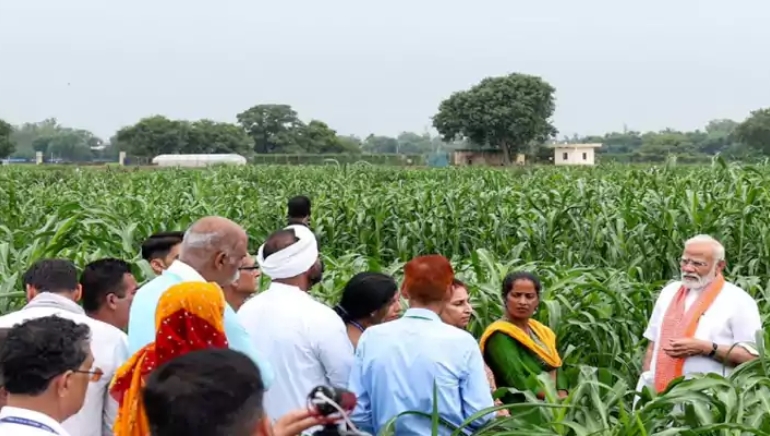Context:
Recently, Pradhan Mantri Annadata Aay SanraksHan Abhiyan (PM-AASHA) has greatly helped, benefiting 2.75 lakh farmers, and procured 6.41 LMT Pulses in Rabi 2023-24.
- Launch – In September 2018
- Aim- It is an umbrella scheme focused on providing price assurance for pulses, oilseeds, and copra, ensuring financial stability for farmers, reducing distress selling, and promoting crop diversification.
- PM AASHA has become a source of hope for millions of small and marginal farmers by ensuring stable incomes and stabilizing market prices.
- The scheme empowers farmers to be self-reliant and also protects them from market fluctuations and intermediaries who take a large portion of the price for their produce.
Minimum Support Price (MSP) –
- It is the lowest price set by the government for certain crops like cereals, millets, pulses, oilseeds, copra, cotton, and jute, ensuring fair prices for farmers.
- The government fixes MSP at 1.5 times the cost of production for 24 crops.
- It will help to protect farmers’ income which is expected to go a long way towards the welfare of farmers.
- It is expected that the increase in MSP will be translated to farmer’s income by way of strong procurement mechanisms in coordination with the State Governments.
- The Government has converged the Price Support Scheme (PSS) & Price Stabilization Fund (PSF) schemes in PM AASHA to serve the farmers and consumers more efficiently.
- The three components of the scheme aim to enhance agricultural productivity, reduce cultivation costs, and ultimately boost and secure farmers’ income in the long term.
- Price Support Scheme (PSS):
- Itis being implemented by the Government of India on the request of the State government.
- Main crops of the state like Bajra, Jowar, Maize, Paddy, Cotton, Tur, Moong, Urad, Groundnut, Sesamum Wheat, Gram, Mustard, Sugarcane, etc. are covered.
- The scheme reduces post-harvest losses and ensures timely payments to farmers, directly improving their livelihoods by securing better prices for their crops, it stimulates economic growth in rural areas.
- In addition to the National Agricultural Cooperative Marketing Federation of India (NAFED), the Food Corporation of India (FCI) will also handle PSS operations in various states and districts.
- Price Deficit Payment Scheme (PDPS):
- PDPS ensures a remunerative price for oilseed producers by covering the price difference between MSP and market prices.
- The Central Government directly pays the difference (up to 15% of MSP value) to pre-registered farmers.
- Farmers can sell up to 40% of their oilseed production through a transparent auction process in notified market yards.
- The payment is made for oilseeds sold at Fair Average Quality (FAQ) within the prescribed period.
- States/UTs can choose to implement either PSS or PDPS for oilseeds in a given year/season.
- Price Private Sector Support Scheme
- In addition to PDPS, states can implement the Price Private Sector Support Scheme (PPSS) on a pilot basis in selected districts or Agricultural Produce Market Committees (APMCs), involving private stockists.
- This scheme enables private players to participate in crop procurement.
- The pilot districts or selected APMCs will focus on one or more oilseed crops for which MSP is notified.
- Market Intervention Scheme (MIS):
- Coverage increased from 20% to 25% of horticulture crop production.
- Introduced direct payment to farmers’ accounts instead of physical procurement for efficiency.
Government will cover transportation and storage costs for Tomato, Onion, and Potato crops to support farmers and consumers.

